NHS strike postponed
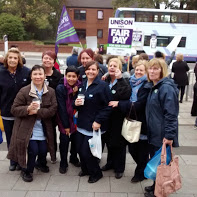
With less than 48 hours before today’s planned 12 hour nationwide strike of NHS nurses, porters, cleaners, ambulance staff, secretaries and support workers over low pay, the Government struck a deal with the main healthcare unions, who represent hundreds of thousands of NHS workers. The strike has been postponed. For now.
UNISON head of health and the unions’ lead negotiator, Christina McAnea said:
“The two strike days staged by health workers last year have moved the government to negotiate with the unions.
“This isn’t a great offer but it addresses some of the key concerns unions have about low pay in the NHS. In the interest of patients’ safety unions will now consult members.
“It will now be up to members to decide whether to accept or reject the proposals. If they choose to reject them we will move to further industrial action.”
The deal put forward by the Government:
- A 1% pay rise for staff up to band 8B which takes in senior nurses
- Lower paid staff will also get an extra £200 a year in their salary
- And the bottom level of pay will be increased to £15,100 a year
- There is also a commitment from the government that the NHS Pay Review Body will continue to make future recommendations on pay uplift for NHS staff in 2016/17
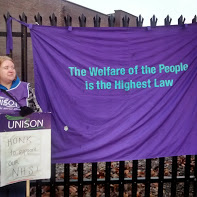
Union members voted to stand in solidarity and take industrial action for an increase in their pay. Their vote and willingness to go on strike gave their unions greater strength when collectively bargaining with the Government. If accepted by union members, the result of the collective bargaining will see the majority of NHS staff receive a pay rise (albeit nowhere near enough!).
NHS staff have been offered an improved pay deal because unionised workers stood up to the Government.
Overworked & Underpaid: the NHS strike
This Thursday (29th January), NHS staff were planning to walk out in the latest round of industrial action; action called by 11 healthcare unions, representing hundreds of thousands of NHS staff..
The reason? An NHS nurse, one of the most important and valued people in our country, is losing £250 a month in his or her pay packet because of this Government.
Over 20,000 NHS workers across the UK are paid below the living wage, as a result of this Government’s policy. For the first two financial years following the 2010 election, NHS pay was frozen, with just the £250 lump sum offered to those earning below £21,000.
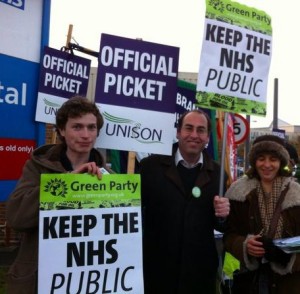
At the same time, inflation has seen prices rise over the past 5 years of basic essential living costs: fuel, heating, food, clothes. But because pay has not risen with inflation, NHS staff have seen real-term cuts to their wages of approximately 10%.
In response, forced into fighting for a decent wage, in 2014 health workers across the country in 11 health trade unions voted overwhelmingly for industrial action (only the Royal College of Nursing refused to even ballot their members on the issue).
The Green Party completely supports their efforts to secure a pay rise and attempts to convince the government to rethink its desultory offer. Many Greens, including leader Natalie Bennett, have visited numerous picket lines to provide practical solidarity.
NHS Dispute background
The NHS pay dispute was caused by the government’s refusal to honour the (less than inflation) 1% pay rise recommended by the independent NHS pay review body.
Instead, the government decided to give a 1% unconsolidated increase (meaning it won’t affect pensions, overtime or unsocial hours, nor rolls over to the next financial year) only to those at the top of their pay band. This means that 60% of all NHS staff (and 70% of nurses, probably the most cherished and hard-working people in the UK) won’t get a pay rise for at least another two years.
NHS wages haven’t increased above inflation since 2009 (and have been frozen for the majority of that period)
In real-terms, this meant:
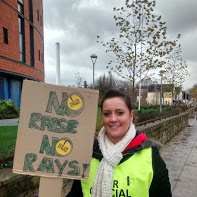
NHS Staff Pay Band 1: losing £91.75 a month
NHS Staff Pay Band 2: losing £119.74 a month
NHS Staff Pay Band 3: losing £141.08 a month
NHS Staff Pay Band 4: losing £212.01 a month
NHS Staff Pay Band 5: losing £253.01 a month
NHS Staff Pay Band 6: losing £332.79 a month
NHS Staff Pay Band 7: losing £391.19 a month
For many, attempting to support a family on these decreasing wages is likely to be extremely difficult. As wages have stagnated and the cost of living soared, NHS workers (in tandem with ordinary people across society) have had to make significant cut-backs to their lifestyles.
A recent UNISON survey found:
- one in five NHS workers needed more than one job to make ends meet.
- 54% were overdrawn every month
- two thirds have had to cut back on food
- 51% have reduced their energy usage
- 44% have cut back on transport use.
- A massive 80% have had to cut back on holidays
- 90% have reduced their expenses on leisure activities, leaving them with little opportunity to recuperate from stressful jobs with long hours.
NHS staff are suffering as a result of continued attacks to their terms and conditions. To meet austerity ‘efficiency savings’ (the £20 billion cut to NHS funding Cameron promised he wouldn’t make), large numbers of staff have been down-banded (being pushed to a lower pay band to do the exact same job); ancillary staff and services have been outsourced; and there has been widespread reduction in staffing numbers – often replaced with lower-paid and lower-qualified agency staff.
Over 35,000 NHS jobs have been lost since the coalition came to power. Staffing numbers are now critically low, but work levels remain constant, so it falls to our remaining health workers to unfairly pick up the slack.
Recent research carried out by the Income Data Services (IDS) found that 63% of NHS staff are regularly working in excess of their contact hours because they feel ‘it is impossible to do their job to a satisfactory standard if they don’t’ and because staff want ‘to provide the best care they can for patients’. Over a third of respondents (36%) reported that additional hours worked are all unpaid.
After the latest insulting pay offer, is it any wonder NHS staff voted to take industrial action (even the Royal College of Midwives, who haven’t once taken industrial action in their entire 132 year history, voted in favour of industrial action)?
The Health Secretary Jeremy Hunt originally tried to justify the miserly pay offer by saying that to give all staff a 1% rise would mean having to sack 14,000 nurses.
There hasn’t been, however, a government minister outlining how many MPs are going to have to be made redundant so they can increase their pay by a massive 11% http://www.carolinelucas.com/latest/caroline-mps-pay-rise-sends-completely-the-wrong-message.
We also wait to see if 14,000 nurses really do lose their jobs now that a 1% pay increase has been offered. I doubt it.
Attacks on pay and conditions of public sector workers and ordinary people are deliberate attempt to shift the cost of the financial crisis (caused by the financial and political elite) onto those who did the least to cause it. While ordinary people see their living standards decline with the most prolonged retraction of wages since the Victorian times, the Government cuts taxes for the wealthy and the super-rich continue to amass record fortunes.
With A&E services already starting to crack up, only the heroic goodwill of staff is the glue that is currently holding the NHS together.
But instead of our government thanking them, they are being undervalued and underpaid. The resulting stress, work-absences, disillusionment and tiredness is putting patient’s lives in danger and turning our brilliant nurses into the UK’s most unhappiest staff.
The chances of success in this industrial action were always higher than many thought. Public opinion is on the side of the unions: two thirds of Britons believe that the 1% pay offer is unfair, and 60% believed that strike action is justified. This public support is what is likely to have brought Jeremy Hunt to the negotiating table.
The NHS is its staff. If you value our amazing healthcare staff, then we should all support the union members and their industrial dispute.
William Quick
Theatre porter, Southmede Hospital
UNISON Steward
Bristol Green Party
https://agreentradeunionist.wordpress.com
Matt Hanley
UNISON Local Organiser
Manchester Green Party


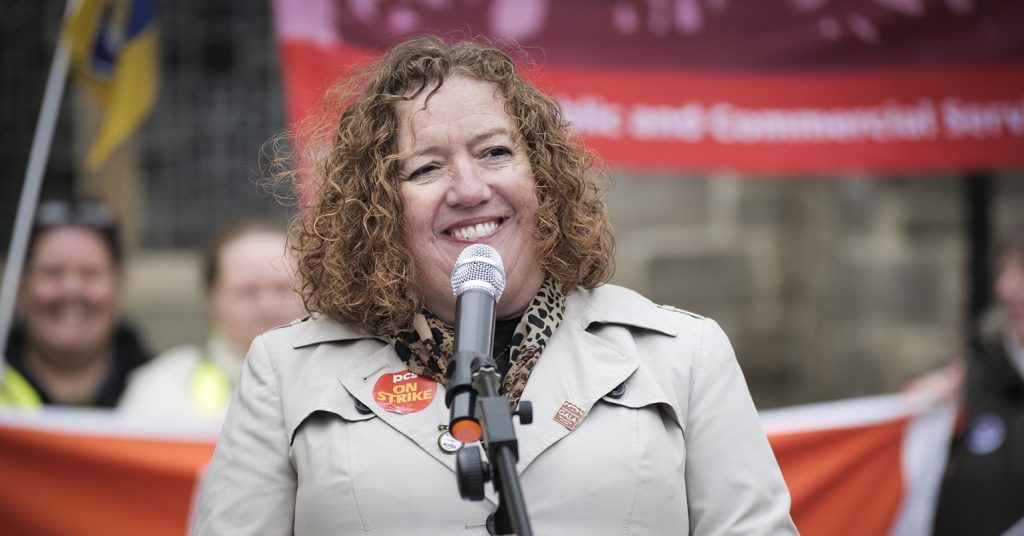
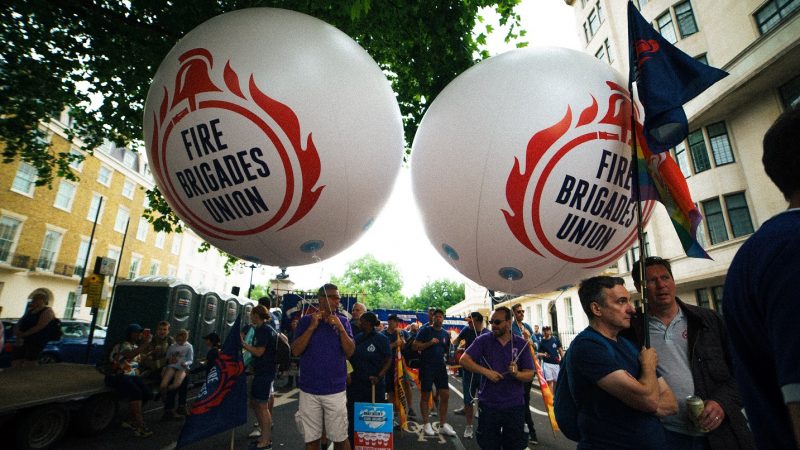
Hi there friends, nice article and I enjoyed it a lot.